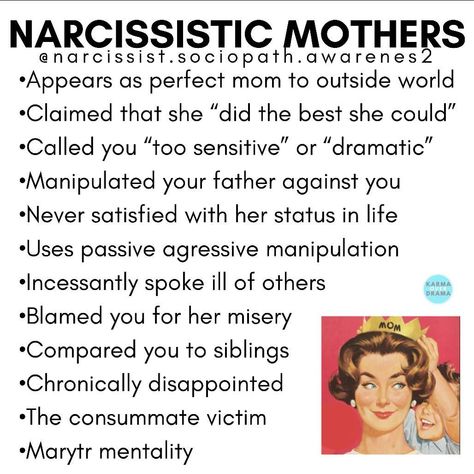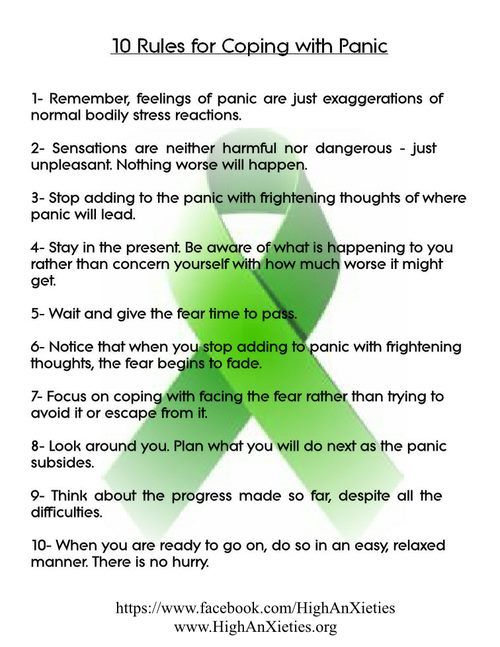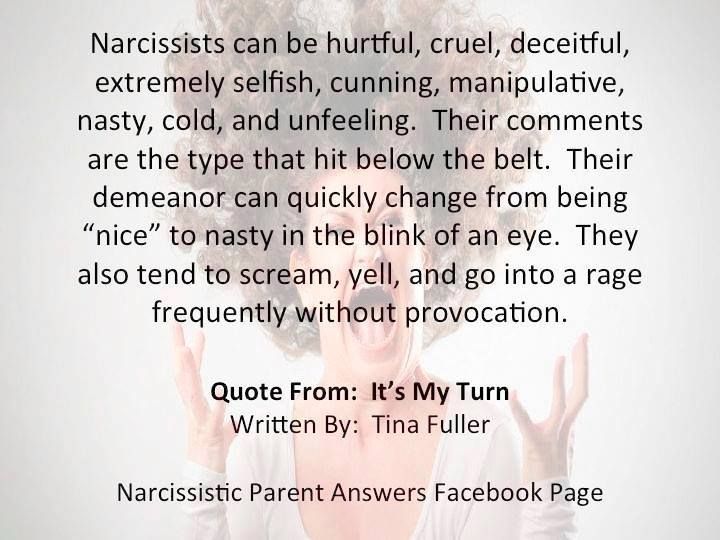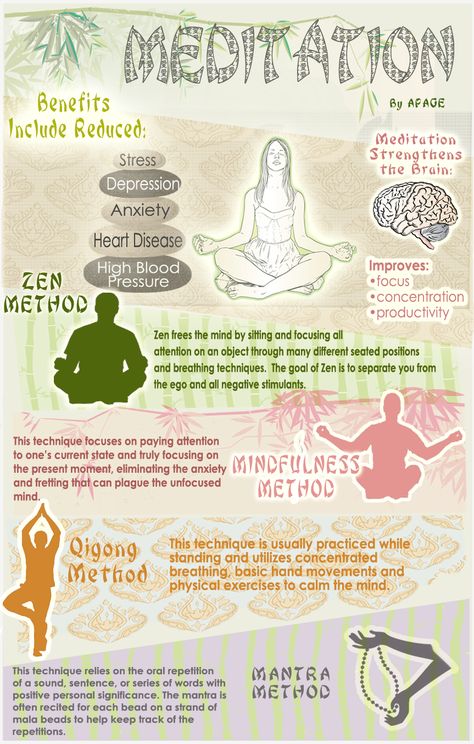Dealing with anxiety about work
Anxiety and Stress in the Workplace
Boost Search Results
On
Having an anxiety disorder can make a major impact in the workplace. People may turn down a promotion or other opportunity because it involves travel or public speaking; make excuses to get out of office parties, staff lunches, and other events or meetings with coworkers; or be unable to meet deadlines.
In a national survey on anxiety in the workplace, people with anxiety disorders commonly cited these as difficult situations: dealing with problems; setting and meeting deadlines; maintaining personal relationships; managing staff; participating in meetings, and making presentations.
Tell Your Employer?
It’s your decision to tell your employer about your anxiety disorder. Some people do so because they need accommodations, others want to educate people about their condition, and some do not want to hide their illness.
If you have a physical or mental disability and are qualified to do a job, the Americans with Disabilities Act of 1990 (ADA) protects you from job discrimination. Being qualified means you must satisfy an employer’s requirements for the job and be able to perform essential functions on your own or with reasonable accommodation. An employer cannot refuse to hire you because your disability prevents you from performing duties that are not essential to the job. Find out more about employment rights.
Tips to Manage Stress and Anxiety at Work
Getting stressed out at work happens to everyone, and it’s perfectly normal. But stress that is persistent, irrational, and overwhelming and impairs daily functioning may indicate an anxiety disorder. Keep these ideas in mind to keep your work life manageable:
- Work! In addition to financial reasons, working can be important for your self-esteem and it adds to your social identity.
- Tell a trusted coworker. Knowing that someone accepts your condition can be comforting and it may reduce any anticipatory anxiety about having a panic attack at work.
- Educate yourself.
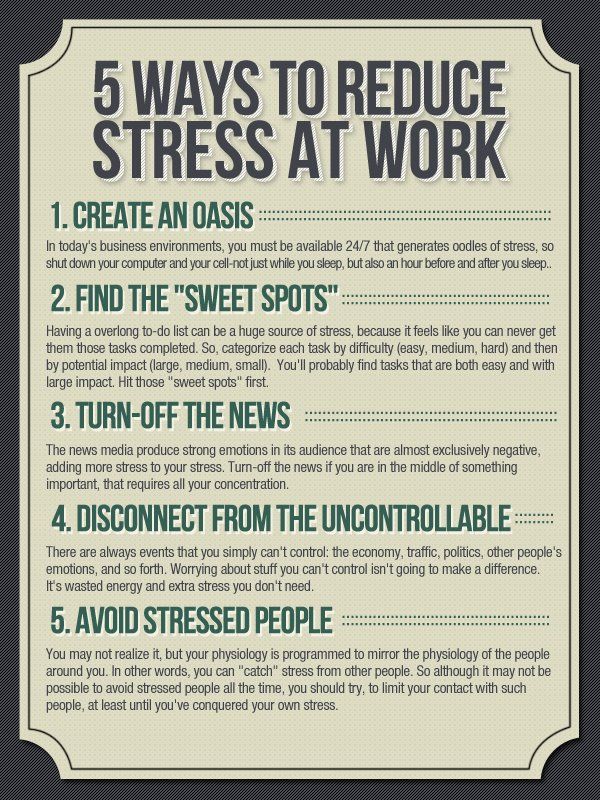 Learn to recognize the symptoms of your disorder and how to handle them if you experience any at work.
Learn to recognize the symptoms of your disorder and how to handle them if you experience any at work. - Practice time management. Make to-do lists and prioritize your work. Schedule enough time to complete each task or project.
- Plan and prepare. Get started on major projects as early as possible. Set mini-deadlines for yourself. Anticipate problems and work to prevent them.
- Do it right the first time. Spend the extra time at the outset and save yourself a headache later when you have to redo your work.
- Be realistic. Don’t over commit or offer to take on projects if you don’t realistically have enough time.
- Ask for help. If you’re feeling overwhelmed, ask a coworker for help. Later you can return the favor.
- Communicate. Speak up calmly and diplomatically if you have too much to handle. Your supervisor may not realize you’re overextended.
- Stay organized. Filing and clearing your desk and computer desktop may rank low on your priority list, but they can save you time in the long run and may prevent a crisis later.
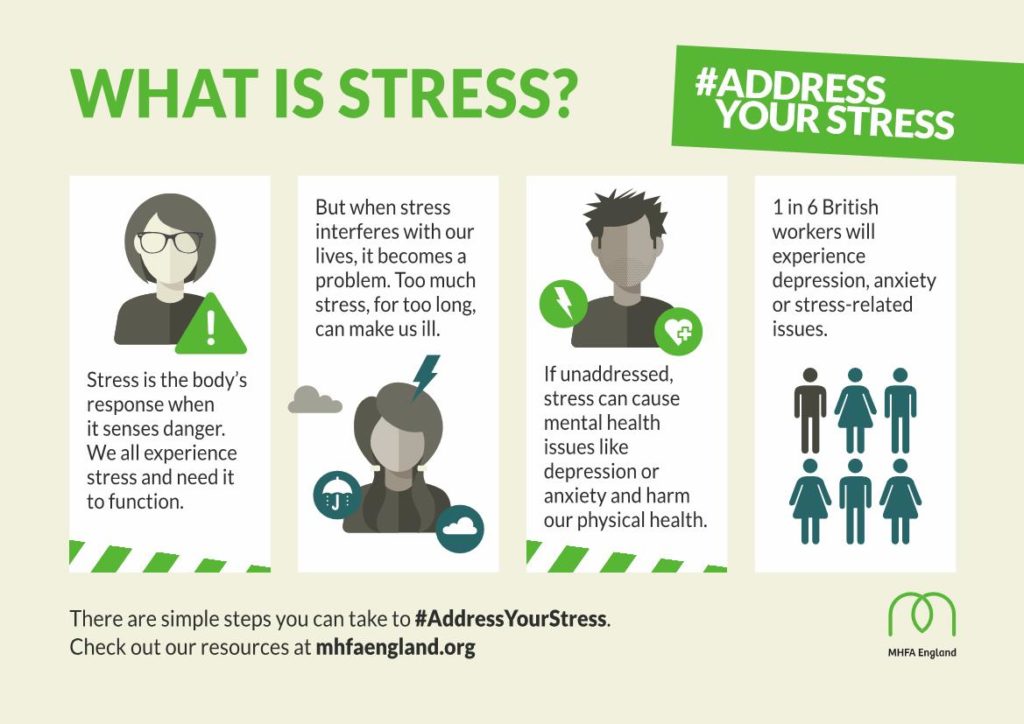
- Avoid toxic coworkers. Try to ignore negativity and gossip in your workplace.
- Take breaks. A walk around the block or a few minutes of deep breathing can help clear your head.
- Set boundaries. Try not to bring work home with you. Don’t check your work e-mail or voice mail after hours.
- Savor success. Take a moment to celebrate your
- good work before moving on to the next project. Thank everyone who helped you.
- Plan a vacation. You’ll be rejuvenated and ready to work when you come back.
- Take advantage of employer resources and benefits. Your workplace may offer an Employee Assistance Program (EAP), discounts to gyms, or skill-building courses. Learn what’s available to you.
- Be healthy. Eat healthfully, get enough sleep, exercise regularly, and limit caffeine and alcohol. Try to keep your body and mind in shape to handle challenging situations.
Getting Help
It’s important to find help for anxiety, stress, and related disorders.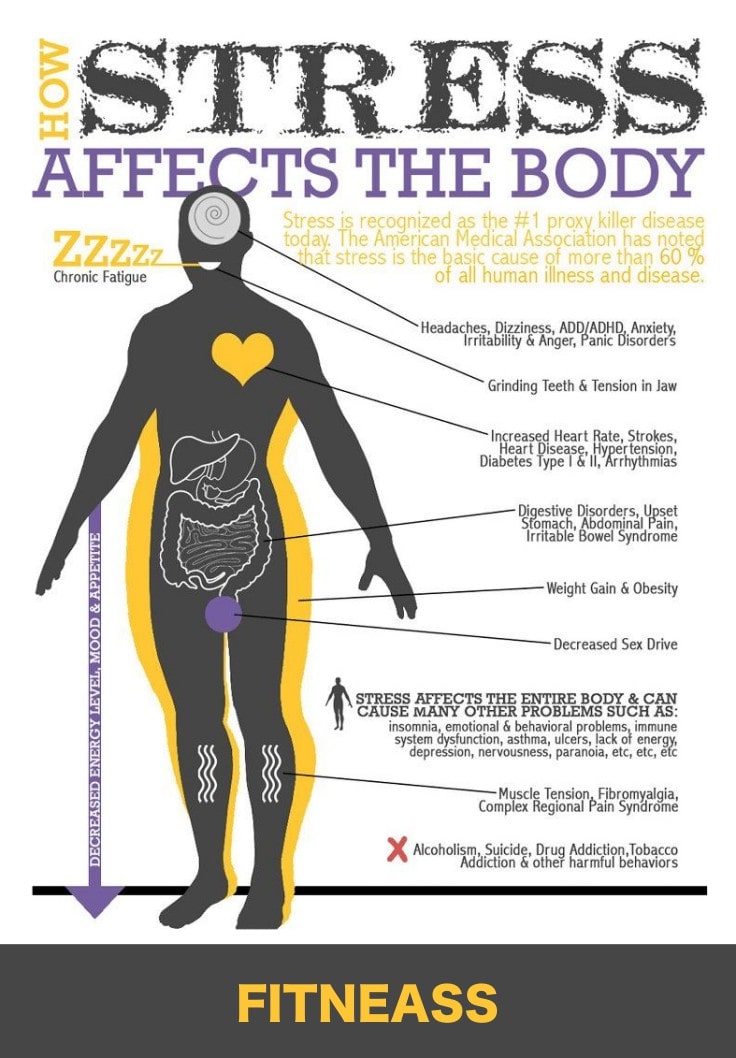 Find a therapist near you.
Find a therapist near you.
With treatment, most people find significant improvement. Several standard approaches have proved effective. Your health care professional will use one or a combination of these treatments:
- Therapy
- Medication
- Complementary and alternative treatment
Resources
American Psychological Association Workplace Issues
Bazelon Center for Mental Health Law
Fit Small Business: Article: How to Prevent and Deal with Discrimination in the Work Place, May 15, 2017
U.S. Equal Employment Opportunity Commission
Facts About the Americans With Disabilities Act
Mental Health America
10 Tips to Manage Anxiety at Work & Survive Until 5pm
Work anxiety can drastically affect your quality of life and leave you counting down the minutes until five o'clock comes around. Roughly three out of every four people with stress or anxiety in their life say that it interferes with their daily lives, and the workplace is no exception. Anxiety can affect performance at work, the quality of the work, relationships with colleagues, and relationships with supervisors. And if you have a diagnosed anxiety disorder, then these challenges may prove even more difficult.
Anxiety can affect performance at work, the quality of the work, relationships with colleagues, and relationships with supervisors. And if you have a diagnosed anxiety disorder, then these challenges may prove even more difficult.
People report that deadlines and dealing with difficult people are the biggest causes of work-related stress.¹Conflict in the workplace will elicit many different reactions. Some people love the drama, while others would rather hide under their desks until the commotion subsides. Regardless of whether or not you thrive on conflict, lack of effective communication at your job can cause quite a bit of anxiety. When several people in the office are visibly affected by anxiety, the level of stress can almost feel contagious. People begin to miss more work, the quality of work goes down, and coworkers begin to gossip or vent rather than work together to solve problems. People stop talking to one another, they start collecting mountains of grievances, and the environment can become downright toxic.
The first step in managing work anxiety is building a personal wellness plan. If you’re getting adequate sleep, eating healthy, exercising, and engaging in social activities outside of work, then your odds for decreasing workplace anxiety are much greater.
But reducing anxiety in the workplace requires more than mindfulness exercises or a yoga class every now and then. You must also examine how you function in workplace system and how you deal with others. Do you hide from your boss? Do you gossip with your coworker in the neighboring cubicle? Do you wait to speak up until you’re seething with anger or bursting into tears? There are a few simple strategies you can start examining and practicing to help you arrive at work calmer and not take worries home with you. In addition to seeking professional help to manage anxiety, you can use these interpersonal strategies to help lower overall anxiety in the office and help you stay calm, focused, and productive. Let’s take a look at a few.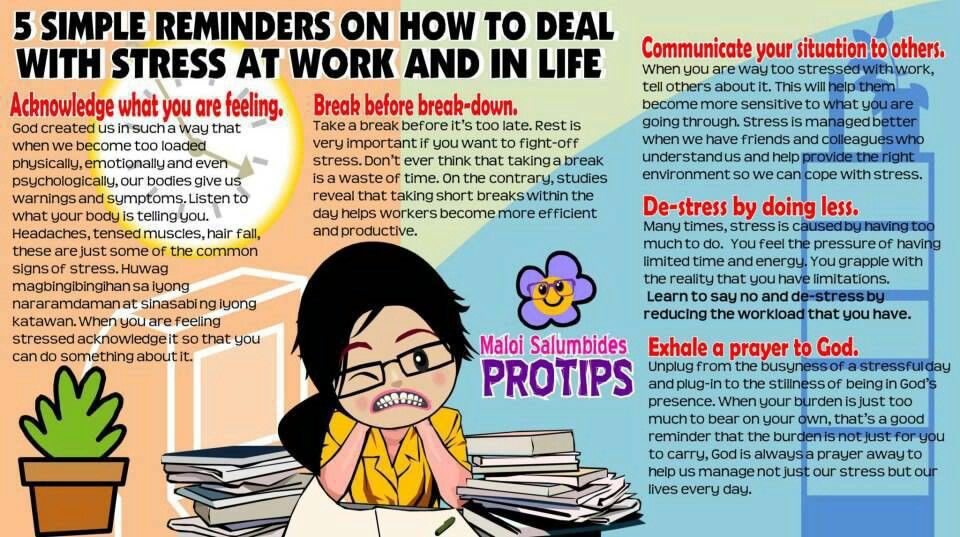
Know Everyone’s Name
Having a solid one-to-one relationship with people in the office makes it easier to address problems with the original individual rather than gossiping or venting to others. This starts by knowing people’s names and their responsibilities. If you forget a person’s name, don’t be embarrassed to ask again. It’s never too late to start building stronger relationships at the office.
Ask For Help
When work is hectic, it becomes all too easy to say "yes" even when you don’t understand how to do something. But the discomfort of asking for help or clarification is worth it in the long run, and it can decrease overall anxiety about responsibilities. Asking for help also communicates to your superiors that you genuinely care about doing a good job.
Avoid Triangles
Many workplaces are built on gossiping about coworkers or venting about others. Though this might provide temporary relief or entertainment, it only serves to build up tension and stress. You can almost feel it floating in the air when an office is full of this kind of negativity. Bonding with someone by talking about a third person is called “triangling,” and it’s an unhealthy way to manage work anxiety. Examples of triangles might include gossiping about a third person, criticizing someone behind their back, and using them as a scapegoat.
You can almost feel it floating in the air when an office is full of this kind of negativity. Bonding with someone by talking about a third person is called “triangling,” and it’s an unhealthy way to manage work anxiety. Examples of triangles might include gossiping about a third person, criticizing someone behind their back, and using them as a scapegoat.
Though it might be tempting to vent to a coworker, consider how you can keep the issue between you and the person with whom you have conflict. Though it might be difficult at first, you can reduce your anxiety by approaching the individual and communicating the facts of the situation. Tell them you’d like to reach a resolution and are motivated to create an open and honest workplace. If you’re an employer or supervisor, consider how you can encourage employees to work out conflict between themselves and approach you honestly if they have an issue with your leadership.
Set Honest Deadlines
Anxious people sometimes will agree to deadlines and timelines that they know they cannot meet.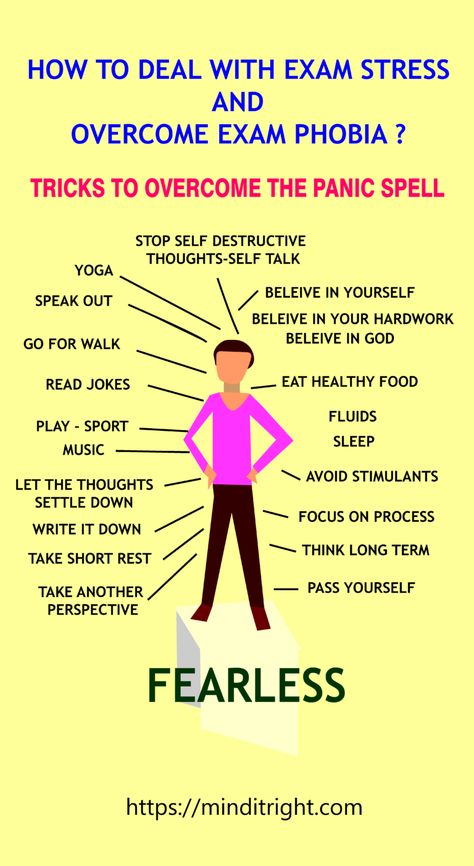 Often it’s better to be honest upfront than to apologize later. Not every deadline is negotiable, but it will save you hours of anxiety if you can be honest upfront and work at a manageable pace. And if you finish the job ahead of time, that will make you look even better.
Often it’s better to be honest upfront than to apologize later. Not every deadline is negotiable, but it will save you hours of anxiety if you can be honest upfront and work at a manageable pace. And if you finish the job ahead of time, that will make you look even better.
Use Neutral Language
Learning to use neutral and calming language in the office can help bring down everyone’s anxiety at work. Disagreements are more manageable when you begin a statement with, “Here’s what I’m thinking,” and end it with, “What are you thinking?” This lets people feel like they have input and makes them more likely to hear what you’re saying. Questions like, “What could we each do about this issue?” or “How could we prevent this from coming up in the future?” are also great for problem-solving.
It’s human instinct to avoid or cut off contact with people who make us uncomfortable, and the workplace is no exception. Maybe you stop replying to emails that you don’t know how to answer.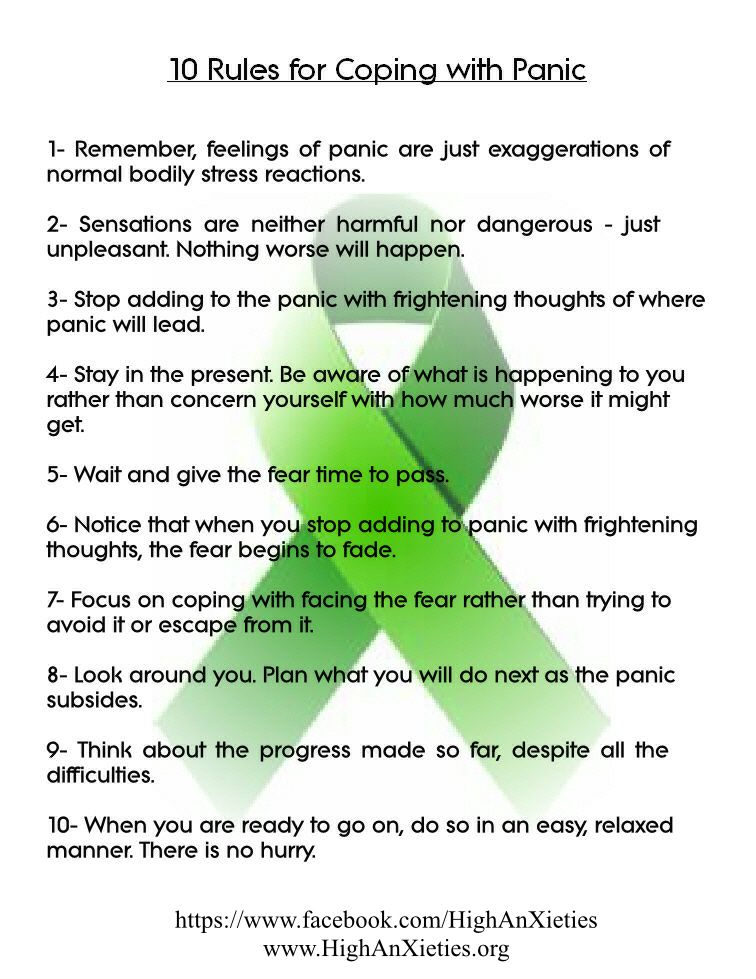 Or perhaps you avoid the break room after you’ve had a disagreement with a bullying coworker. Maybe you try and duck out for the day before your boss can catch you with a question. The problem with avoidance is that it’s only a very temporary solution. That twisting feeling in your stomach or other work anxiety symptoms will only get worse over time the more you use distance as a way to manage disagreement, confusion, or other difficult emotions.
Or perhaps you avoid the break room after you’ve had a disagreement with a bullying coworker. Maybe you try and duck out for the day before your boss can catch you with a question. The problem with avoidance is that it’s only a very temporary solution. That twisting feeling in your stomach or other work anxiety symptoms will only get worse over time the more you use distance as a way to manage disagreement, confusion, or other difficult emotions.
Contact is a muscle you have to flex to make it stronger. The more you approach problems and communication head-on, the less anxious it will make you over the long term. Great leaders have the ability to maintain contact with people who have different points of view or styles of work. Staying in contact can also help you improve on saying “no” to additional responsibilities that make you overworked and less effective in your job.
Don't Drag Others Down
Office drama can be entertaining at times, but it ultimately makes the environment more stressful and lowers morale.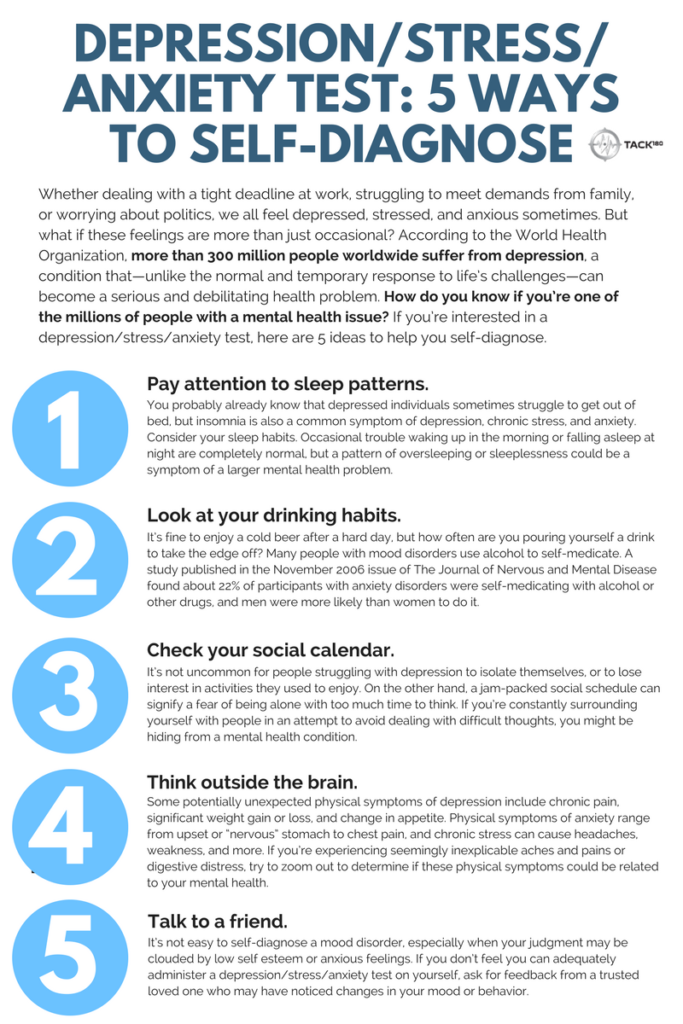 Try changing the subject when people talk poorly of coworkers or the boss, or simply come up with a reason to leave the room. Don’t respond to texts or emails that seek to drag others down.
Try changing the subject when people talk poorly of coworkers or the boss, or simply come up with a reason to leave the room. Don’t respond to texts or emails that seek to drag others down.
Encourage In-Person Conversations
It can be incredibly difficult to decipher emotions and intensions electronically. Much workplace anxiety comes from misinterpreting emails or waiting to hear back about a difficult subject. If an issue is making you particularly anxious, don’t be afraid to pick up the phone or have an in-person conversation to clarify things.
Focus on the Facts
Your mind and emotions can feel pulled in many different directions when you feel overloaded, under-appreciated or misunderstood. The best way to lower anxiety is to control the conversation and what’s communicated. Try to verbalize what specifically is causing your anxiety and ask other people share their views. Then be sure to express how you’d like to this specific conflict to be resolved. Focus on the facts of the situation, and stay in the present.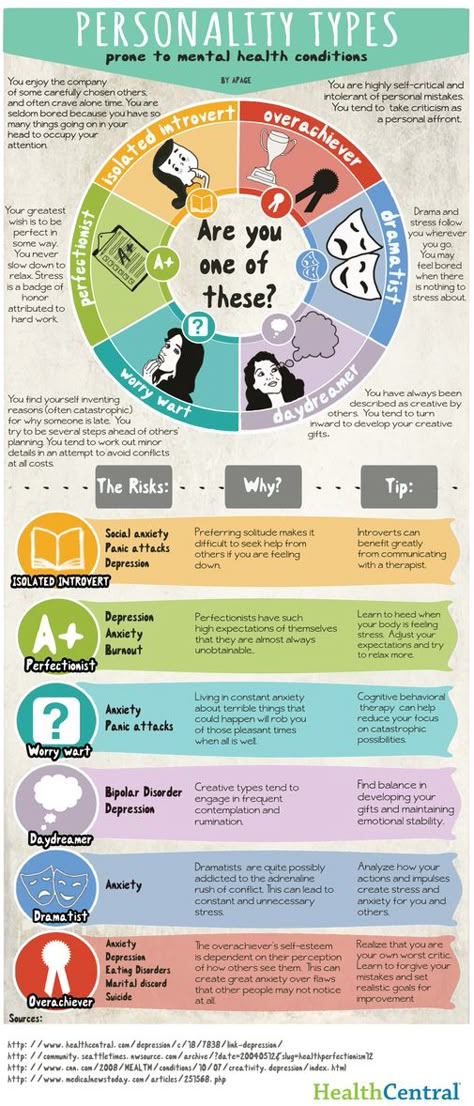 This probably isn’t the best time to pull up past grievances, no matter how relevant they may seem.
This probably isn’t the best time to pull up past grievances, no matter how relevant they may seem.
It will be tempting to pull out your arsenal of complaints when you feel reactive, but lowering anxiety is not about winning. It’s about resolving. Try to avoid emotionally charged exaggerations that use words like “always” or “never.” Begin your sentences with “I” statements, because “You” sounds too accusatory. If you’re concerned about a volatile reaction from a coworker, then consider having a mediator, usually an HR rep, join the conversation.
Access Resources
Many workplaces have offer counseling through employee assistance programs (EAPs) or can connect you to mental health resources in the community to help you manage anxiety. Though it may be intimidating to speak up about your anxiety, when you take responsibility for your wellness, you serve as a role model for others in the workplace.
When you build more solid relationships, improve communication, and ask for help, the entire office will benefit. Anxiety is always present to some degree in your daily life, but it doesn’t have to interfere with doing good work and enjoying your profession. Remember, though anxiety is an unpleasant emotion, it’s also an opportunity for you to grow in your career. The more you face anxiety in the workplace rather than run away from it or simply complain about it, the more significant a stressor will have to be to make you feel off your game.
Anxiety is always present to some degree in your daily life, but it doesn’t have to interfere with doing good work and enjoying your profession. Remember, though anxiety is an unpleasant emotion, it’s also an opportunity for you to grow in your career. The more you face anxiety in the workplace rather than run away from it or simply complain about it, the more significant a stressor will have to be to make you feel off your game.
- https://www.adaa.org/workplace-stress-anxiety-disorders-survey
Notes: This article was originally published January 23, 2018 and most recently updated February 24, 2020.
How to deal with anxiety at work: 7 tips
Anti-stress
"Most people experience some level of anxiety all the time," says clinical psychologist Keith Cummins. “Remember how nervous you are before a presentation or a conversation with your boss about a pay rise.”
Continuous and intense anxiety is another matter. It interferes with focus and reduces productivity, creating a vicious cycle of stress. According to an American Psychological Association survey, 18% of the population finds it difficult to cope with work responsibilities due to anxiety or other mental problems. nine0003
According to an American Psychological Association survey, 18% of the population finds it difficult to cope with work responsibilities due to anxiety or other mental problems. nine0003
"Being judged on performance can be very troubling," says Ryan Hooper, a clinical psychologist in Chicago. The fear of making a mistake, reinforced by the desire to succeed, can be paralyzing.
Anxiety can be dealt with
External factors also play a role: an unfavorable work environment and strained relationships with colleagues provoke additional anxiety. Anxiety can also be associated with painful memories, such as being fired, or worries about financial well-being. nine0003
You don't have to suffer in silence, anxiety can be dealt with. Here are a few tips to help you manage your stressful day at work.
1. Determine the possible cause
Anxiety is often manifested by rapid heartbeat, sweaty palms, tightness in the chest, trouble concentrating, or a flood of negative thoughts. To cope with an attack, you need to understand what provoked it.
To cope with an attack, you need to understand what provoked it.
Determine the moments at which the anxiety rises. Perhaps it happens while driving to work, while talking to a co-worker, or when you are assigned a new project. If that doesn't work, Ryan Hooper recommends that you start keeping a diary in the evenings and write down all the events of the past day in it. “Describing experiences on paper, you get the opportunity to look at what happened from a different angle,” the psychologist explains, adding that you need to list in the diary what you did during the day and what feelings you experienced. nine0003
2. Try to find a simple solution
Once you figure out what triggers the seizures, you can come up with a solution. For example, if your relationship with a colleague is not going well, talk and set boundaries. If commuting gets on your nerves, take a different route. These decisions will help you feel that you are in control of your mental state.
3.
 When you feel anxiety coming on, ask yourself two questions
When you feel anxiety coming on, ask yourself two questions Develop a strategy to deal with anxiety. “Find a quiet place where you can reset yourself. Retire and analyze thoughts. Ask yourself two questions: “How do I feel right now?” and “What happened today that brought me to this state?”. nine0003
The more often you think about anxiety, the better you will be able to control the state
Then you can do an exercise to relieve tension: deep breathing, relaxing music. Try writing down negative thoughts and think about how you can turn them into positive affirmations. “The more often you comprehend anxiety, not allowing it to remain in the darkness of the unconscious, the better you will be able to control your condition,” says the psychologist.
4. Adjust the rhythm of the day after hours
Develop the habit of taking care of your physical, emotional and mental health. Walk the dog in the evenings, go to a cafe with a friend on Friday, do intense workouts. Cummins advises rethinking the morning routine so that the morning is not entirely devoted to getting ready for work. "Set your alarm 15 minutes early and devote that time to yoga, meditation, or sit down with a cup of coffee and think about something pleasant."
Cummins advises rethinking the morning routine so that the morning is not entirely devoted to getting ready for work. "Set your alarm 15 minutes early and devote that time to yoga, meditation, or sit down with a cup of coffee and think about something pleasant."
5. "Reboot" the brain
When a computer or smartphone starts to work slowly or with errors, we reboot it. So why not "reboot" your brain when anxiety hits? “Try to take breaks during the work day to think about pleasant things,” recommends Cummins. It can be a cup of coffee or a concert that you plan to go to at the end of the week. nine0003
"We need to create a space of positive thoughts that will help reduce anxiety," says the psychologist.
6. Think about the value of your work
Perhaps it gives financial independence or your help makes life easier for clients. “By remembering the value of work, you can look at anxiety from a different perspective,” says Hooper.
7. Tell your boss
If you find it difficult to perform your duties or your performance has declined, Cummins advises telling your boss about it.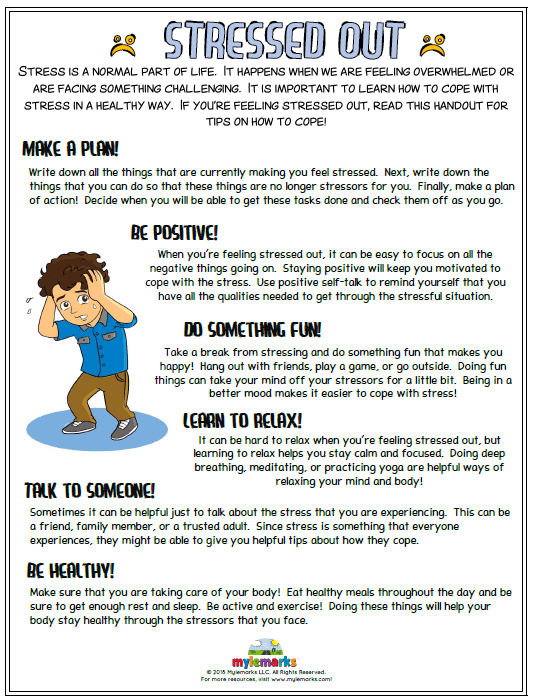 nine0003
nine0003
If anxiety is interfering with your normal life, call the experts
“Most organizations will treat you with understanding or will be willing to discuss ways to deal with stress. If you trust the leader, tell him about your condition. So you will stop feeling that you are left alone with problems. If anxiety is interfering with your normal life, seek professional help. “Anxiety will not go away completely, but with effective treatment it can become less painful and you will start to feel more confident,” explains Hooper. nine0003
Anxiety overcomes many, but this does not mean that you should suffer alone. “Everyone goes through periods of ups and downs, everyone has to deal with depression, sometimes you can’t do without the help of a professional,” says Cummins.
Text: Nikolai Protsenko Photo Source: Getty Images
New on the site
“Friday the 13th”: why we are subject to superstitions — psychologist's opinion
“Everyone at work dumps their duties on me.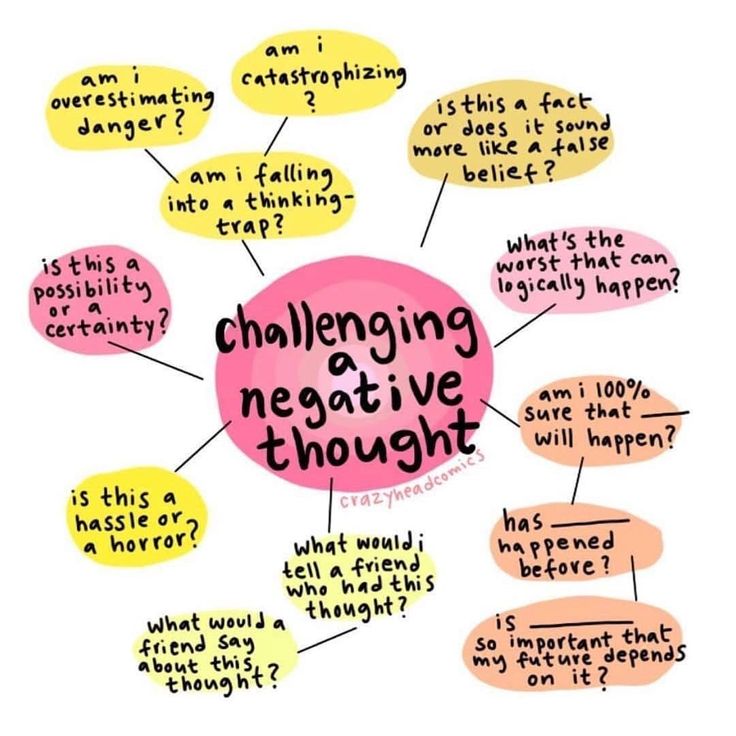 How not to burn out? nine0003
How not to burn out? nine0003
“A dream is also a business project”: what will help you become richer
5 ways to establish a common language with your body career ceiling. What am I living for?
“My wife cannot forget my betrayal and hits me in the face. How to build relationships?
Four minutes is enough: psychologists figured out how the first impression affects the outcome of a date
how best to deal with it at work
I was tense, restless, nervous and restless when my company first introduced a policy of daily review of tasks. For the next 4 hours after the announcement of the policy, my heart was panting.
It was so obvious that my colleague asked me, "Queen, are you okay?" All I could do was nod.
Yes, it would seem that my fear and anxiety is a sign of incompetence or unethical work behavior that may be revealed in the process. But that's not it at all. nine0003
Because even after the daily task performance review started, the company did not find a loophole on my part.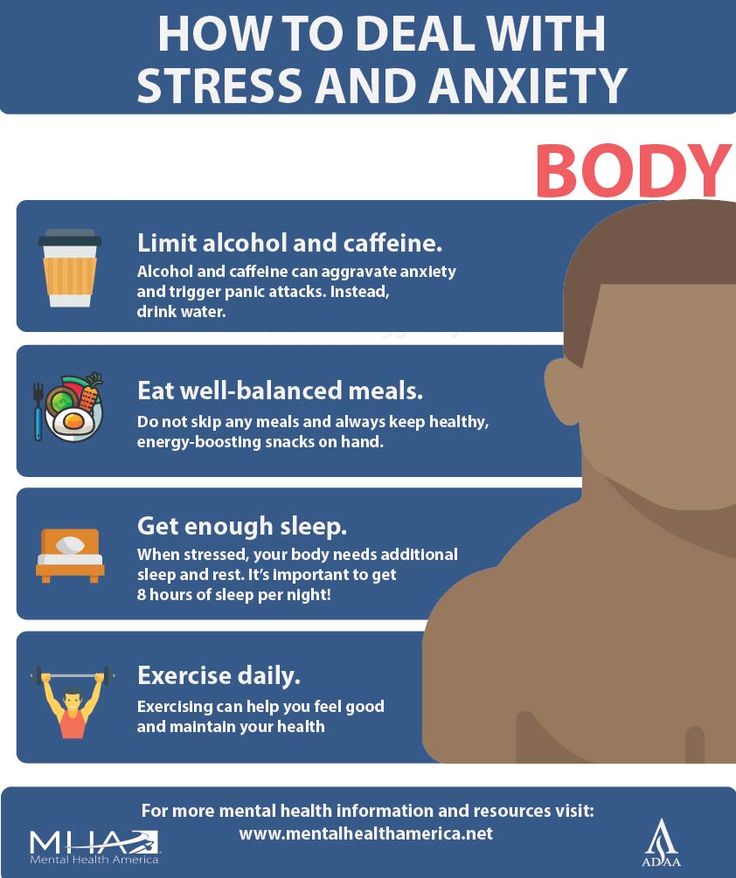
The fact is that from the first day I started working, I worked to give the company the best. Tried to be efficient and competent as well as meet my deadlines.
So what really happened?
Why such anxiety even when I am doing a good job?
What is it called, and why does some part of me still make me feel that repeating my daily tasks is not good for me? nine0003
It's called performance anxiety, and the truth is...
It's normal
I've learned that performance anxiety is normal and can happen to anyone. And besides the job review part, it can be felt during interviews, presentations, brainstorming sessions, and even work meetings.
But this is normal, does not mean that it is right and should continue. Because its negative impact outweighs the positive. In the sense that it can lead to feelings of paralysis, timidity, and difficulty completing tasks. nine0003
Realizing this made us think about how to get rid of this feeling.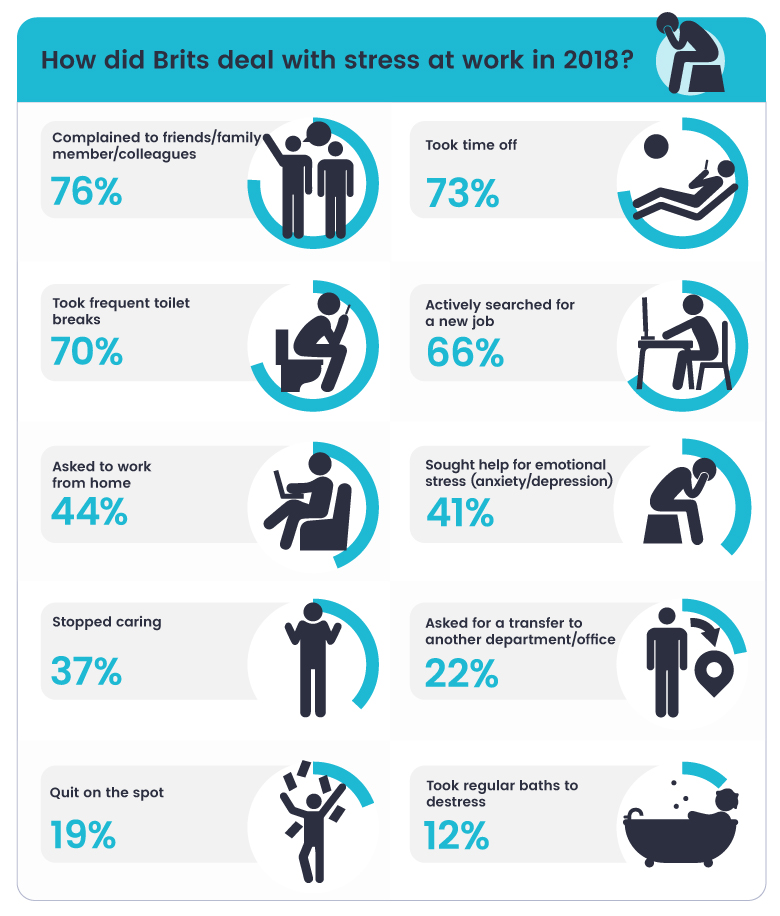 And having a way out, I am now free and bold as an eagle.
And having a way out, I am now free and bold as an eagle.
If you feel this way, you too can be free, bold and more confident, as I have followed me closely in this article.
Because in this article, I've recorded information about performance anxiety at work and tips on how best to deal with it at work.
These tips will help you get rid of self-doubt. nine0003
To get started, let's first understand what Anxiety's performance entails.
What is performance anxiety disorder?
Anxiety disorder is one of the most common mental health problems affecting millions of people worldwide.
In fact, World Health Organization An estimated 260 million people worldwide suffer from anxiety.
No wonder most people find it difficult to endure the constant stress of staying on top of the game in the world. This provided high competition and outstanding performance. nine0003
Unfortunately, performance anxiety can prevent us from achieving what we want to achieve and can quickly derail our careers.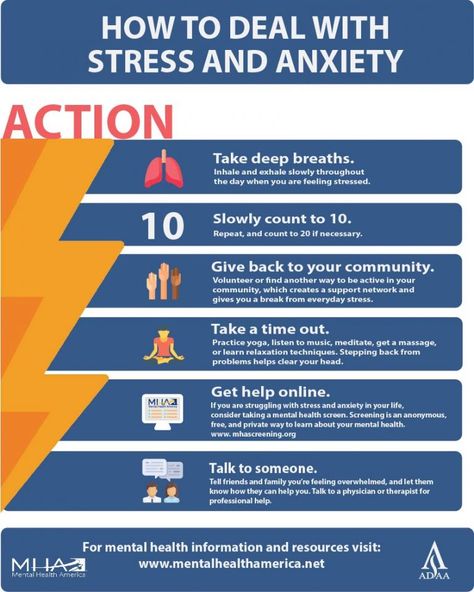 In addition, it can seriously affect our self-esteem and self-confidence.
In addition, it can seriously affect our self-esteem and self-confidence.
Others generally see people with performance anxiety as ambitious, high-achieving perfectionists who deliver nothing short of flawless achievement, which is ironic. These people contribute a lot to the overall well-being of the company at work. nine0003
Many of us are unaware that people who suffer from performance anxiety experience great internal self-doubt.
In fact, their anxiety stems from a conflict between self-esteem and self-doubt.
If you want to stop worrying about performance, you must first change your mindset.
See also: Preparing for performance testing: 10 things you need to know well
What can cause you to worry about performance at work?
Lots!
Worrying about performance at work can do you more harm than good. It can ruin or sabotage your career and even put you out of a job for a long time.
And without warning, this can lead to disappointment and even a suicide mission.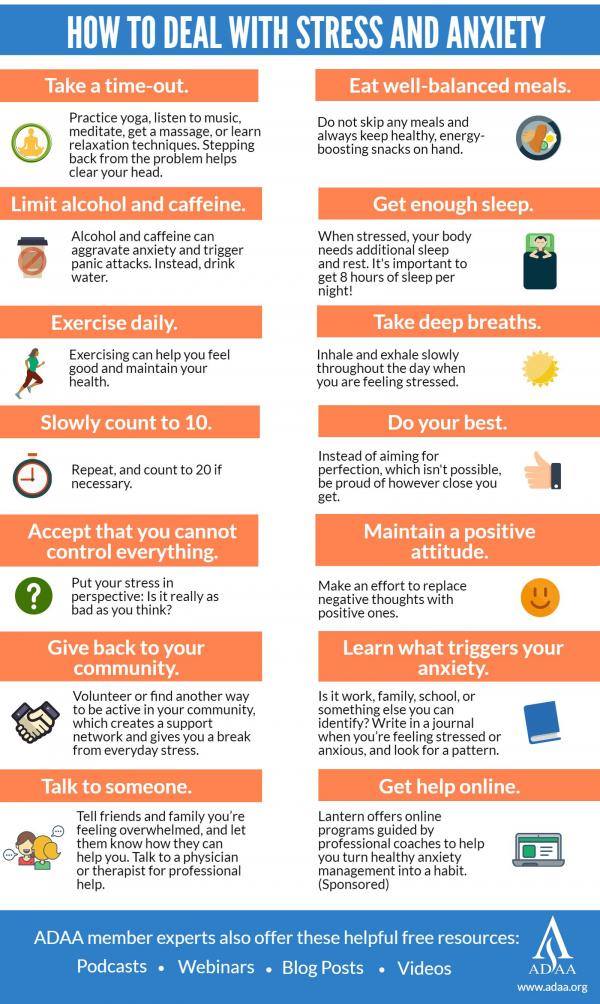 Some of the symptoms of performance anxiety include fast heart rate and rapid breathing, dry mouth, and a tight throat. nine0003
Some of the symptoms of performance anxiety include fast heart rate and rapid breathing, dry mouth, and a tight throat. nine0003
Other symptoms may include trembling in the hands, knees, lips and voice, sweaty and cold hands, nausea and abdominal discomfort.
To clarify the details, below are some of the implications of performance anxiety in the workplace.
Loss of focus
There is nothing more distracting in the workplace than performance anxiety. When you always feel on edge when you have a task, you can easily lose focus on your work. nine0003
You can spend hours staring at your laptop or switching tabs without doing anything out of fear.
It can be annoying
Feeling anxious about performance can make you irritable, impatient and restless at work. It can save whatever atmosphere you came to work with and even affect your colleague.
Yes, you must forcefully wear smiles when dealing with anxiety, learn how to maintain a good mood in a work environment. You can be annoying when you make your team think that you are uncooperative or emotionally upset. nine0003
You can be annoying when you make your team think that you are uncooperative or emotionally upset. nine0003
Anxiety at work can distract you
People with anxiety at work are constantly in a state of fight or flight and therefore find it difficult to concentrate on daily work tasks.
This means that you either lace up your gloves to protect yourself, or you give up your duties and colleagues.
Kills your career
Social contacts are another source of professional anxiety. This means that when you go to a networking event, you stay in the corner and hope to go unnoticed, and then leave as soon as possible. nine0003
When your colleagues go to lunch, you are too afraid to join them to have lunch and chat. Unfortunately, succumbing to our social anxiety triggers can lead to job stagnation as we avoid circumstances that are important to progress.
How to best manage performance anxiety at work
Fortunately, there are many things you can do to help manage performance anxiety at work. nine0003
nine0003
Some of them include:
#1. Be proactive in planning
Since anxiety is primarily about what might happen in the future, planning is a great way to prepare for unpleasant surprises.
Whether you need to make an impactful presentation, present a creative concept or pass a performance evaluation, preparation will save you a lot of time and nerves.
However, you will have a whole new way of looking at things once you write it down. In other words, a well thought out plan of action provides the clarity and direction your nervous mind desperately needs. nine0003
First of all, you will be more likely to control your performance anxiety if you follow the instructions and stick to your strategy.
# 2.
Challenge your thinkingWhen it comes to anxiety, it's how you interpret circumstances or events that make you anxious and uncomfortable.
One of the signs of performance anxiety is when you are more concerned about how others see us.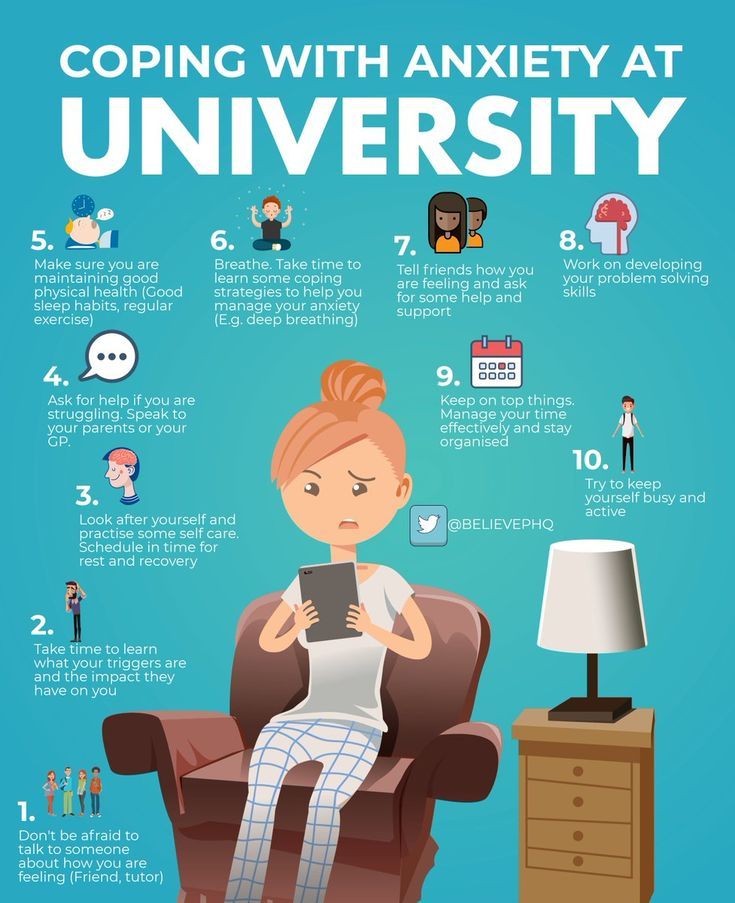 When you have a personal negative interpretation of other perceptions of you. nine0003
When you have a personal negative interpretation of other perceptions of you. nine0003
This can be really difficult.
In truth, if you believe that your audience will be tough people who will seek to expose your mistakes and expose your shortcomings, your work will be affected.
So, learn to refute the erroneous thoughts that cause you anxiety. Have a positive feeling that will result from a rational assessment of your overall achievements.
In this way, it can help you become better, inspiring you to do better next time. nine0003
#3. Failure should be rethought.
Since performance anxiety is rooted in fear of poor grades, it would be a good idea to reframe failure as a positive learning opportunity.
Negative ratings are feared by those who are concerned about labor productivity. This is because we perceive criticism as a clear and irrefutable indicator of failure.
However, failure at work can mean losing a big project to your competitors, being fired, being unable to pay your mortgage, and eventually being on the street.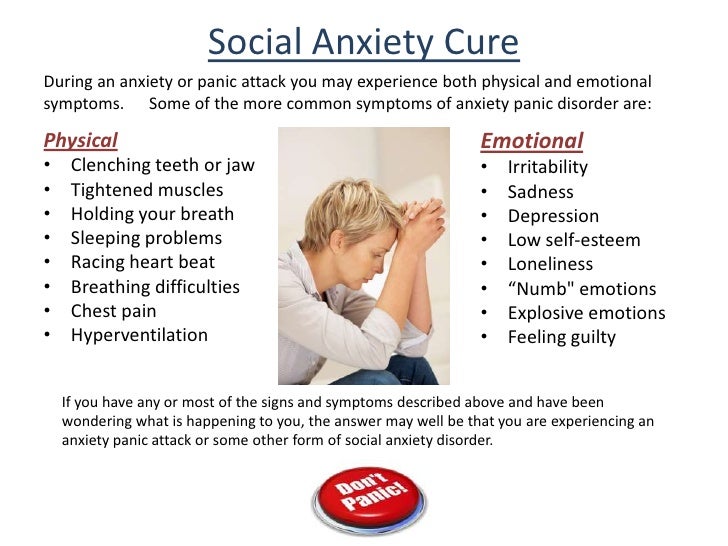 nine0003
nine0003
See how anxiety-driven thinking can spiral us into a series of worst-case scenarios, each worse than the last!?
On the other hand, failure is part of life; it's part of being "in the game".
If there is one thing that all successful people have in common, it is that they fail more often than you can imagine. In truth, their path to success was more of an obstacle course, and each obstacle made them stronger and smarter. Consider failure as an opportunity to learn. nine0003
No. 4. Request references
It is very important to expect quality feedback if your anxiety rises when you are unsure of your goal. Constantly trying to clarify action items can not only hurt productivity, but also make less pushy employees feel like a burden to customers.
According to a study by Approve.io, a quick feedback solution for remote freelancers, feedback that lacks clear and explicit action points can cause anxiety. nine0003
As a result, providing meaningful feedback is believed to be the key to minimizing performance anxiety.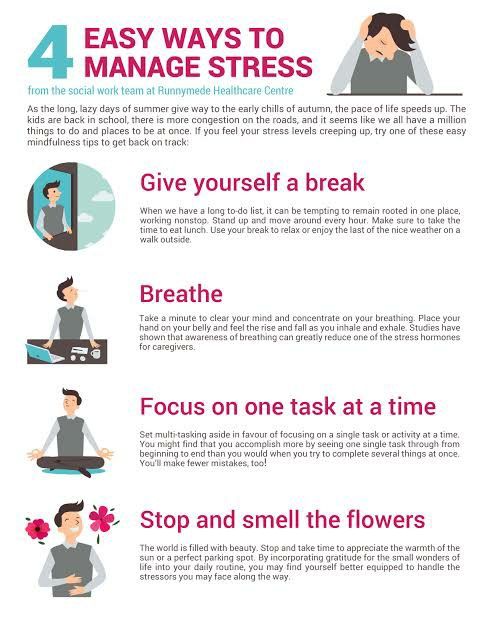
Because you don't know if you're getting it or not, lack of feedback can cause stress and anxiety in the workplace.
Therefore. It is important that you seek the opinion of your boss. Ask for a face-to-face meeting, video calls, or a face-to-face meeting.
No. 5. Remember to be gentle with yourself. nine0017
Forgive yourself if necessary. Also keep in mind that productivity is not always the same as productivity.
None of the above tactics will help unless you want to stop blaming yourself for how your anxiety is affecting your productivity right now.
It is unlikely that you will ever be able to completely get rid of the knots in the abdomen that appear out of nowhere, so do not waste time trying.
Instead, focus on modest victories and incremental successes that will give you a sense of success and progress. nine0003
More tips for coping with work performance anxiety
More tips for coping with work-related anxiety:
- Get good behavior.
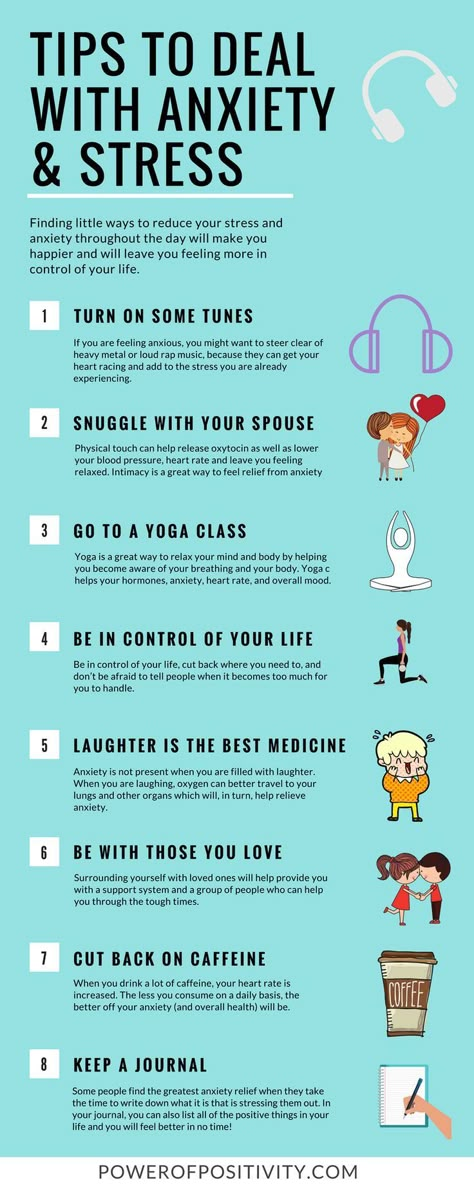 Getting enough sleep, eating right, exercising regularly, and not drinking too much alcohol or caffeine can all help keep your mind and body in good shape.
Getting enough sleep, eating right, exercising regularly, and not drinking too much alcohol or caffeine can all help keep your mind and body in good shape. - Organize yourself. Even if emptying your computer and desk isn't a top priority, staying organized will benefit you in the long run. nine0254
- Be honest with yourself. Don't take on tasks, projects, or assignments you don't have time for if you don't have enough time.
- Communicate. If you need help, ask for it. Speak up if you have too much on your plate. Your boss may not realize that you are overworked.
- Prepare and plan ahead. If you have any important projects, start them as soon as possible and give yourself a minimum deadline. It can also help to anticipate and avoid potential complications. nine0254
- Set clear boundaries for yourself. Don't take your work home with you. Make it a rule not to check your voice mail or work mail after leaving the office, for example.
- Stay away from toxic colleagues.
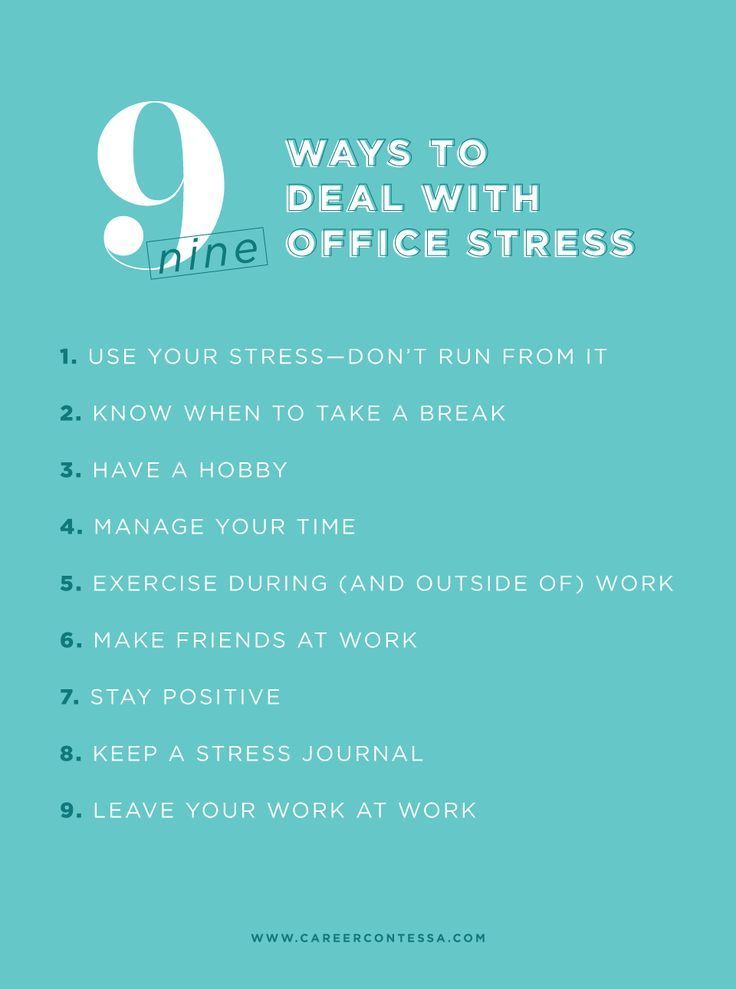
Learn more

